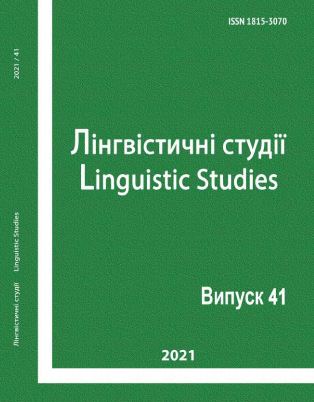Візуальне мистецтво та відеогра як витоки нових жанрів дигітальної поезії.
DOI:
https://doi.org/10.31558/1815-3070.2021.41.22Ключові слова:
візуальні/відео-звукові/візуально-звукові вірші; вірші-відеоігри; інтерактивність; людичність; дигітальна поезія; імерсіяАнотація
Подана розвідка спрямована на порівняльне дослідження візуальних/відео- звукових/візуально-звукових віршів та віршів-відеоігор як типових жанрів дигітальної поезії. У процесі роботи зроблено такі висновки. У той час, як візуальні/відео-звукові/візуальнозвукові вірші сягають корінням візуального мистецтва та експериментують з ним, велика роль, яка відводиться саме мовним компонентам у них, підкреслює необхідність виокремлення їх в окремий жанр саме дигітальної поезії, а не візуального мистецтва. Вірші-відеоігри характеризуються такими типовими рисами цифрової поезії, як людичність та інтерактивність, що уможливлюють новий рівень читацької імерсії.
Посилання
Block, Friedrich. “Auf hoher See in der Turing-Galaxie. Visuelle Poesie und Hypermedia”. Text und Kritik. Visuelle Poesie. Ed. by Arnold, Heinz Ludwig. Sonderband Nr. 9 (1997): 51–64. Print.
Bolter, J. David. Writing Space: Computers, Hypertext, and the Remediation of Print. Routledge; 2nd edition, 2001. Print
Cramer, Floria “Warum es zuwenig interessante Netzdichtung gibt”. Netzliteratur, www.netzliteratur.net/cramer/karlsruher_thesen.html. Web. 2 Feb. 2021.
Fortuna, T.R. O Lugar do brincar na educação infantil. Revista Pátio Educação Infantil, ano IX, n.27, abr / jun. 2011 (2011): 11–15.
Funkhouser, C. T. Prehistoric Digital Poetry: An Archaeology of Forms, 1959-1995. University of Alabama Press, 2007. Print.
Funkhouser, C. T. New Directions in Digital Poetry. Bloomsbury Publishing, 2012. Print.
Huizinga, Johan. Homo Ludens: A Study of the Play-Element in Culture. Angelico Press, 2016. Print.
Landow, George. Hypertext: The Convergence of Contemporary Critical Theory and Technology. Johns Hopkins University Press, 1992. Print.
Nelson, J. Digital Oddities and Creatures. www.secrettechnology.com/about.html. Web. 12 Sept. 2020.
Nikitin, Ievheniy. “O kul'ture chteniya v sets. Setevyie chitateli i kritiki (About the culture of reading online. Web-readers and critics)” Setevaya slovesnost', www.netslova.ru/nikitin_e/o_kulture.html, 20.05.2003. Web. 2 Feb. 2021.
Pozharytska, O. “Computer Literature as a New Modus of the Readers’ Existence”. Science and Education : a New Dimension. Philology. IV (23). Issue 100 (2016): 27‒32.
Pozharytska, O. “Fanfiction as ludonarrative: fanwriters as gamers”. Science and Society. N 1. Vol. 1 (2017): 100-107.
Repantis, Kate. “Computer-Generated Poetry Liberates Readers, Attracts Coders” SLICE.MIT.EDU. (30 Apr. 2014), alum.mit.edu/slice/computer-generated-poetry-liberatesreaders-attracts-coders. Web. 8 Feb. 2021
Schmidt, Enrike “Bukval'naya (ne)dvyzhymost': Dyhytal'naya poezyya v RuLyNete. (Literal (Im)mobility: Digital poetry in RuLiNet)” Russian Literature LVII (2005): 423–440. Print.
Schmidt, Henrike. “Der Computer als “evokatorisches Objekt”. Sprachmaschinen und automatisierte Kommunikation in der russischen Netzliteratur.” Anzeiger für Slavische Philologie XXXI (2003): 33–62. Print.
Simanowski, Roberto. Interfictions. Vom Schreiben im Netz. Frankfurt am Main, 2002. Print.
Simanowski, Roberto. “Concrete poetry in analog and digital media.” dichtung-digital (2003), www.dichtung-digital.de/2003/parisconnection/concretepoetry.htm. Web. 7 Feb. 2021
Samokhina, V. O. Zhart u suchasnomu komunikatyvnomu prostori Velykoyi Brytaniyi i SShA: tekstual'nyy ta dyskursyvnyy aspekty. (Jokes in the modern communicative space of Great Britain and the USA) Diss. Kyiv Taras Shevchenko National U, 2010. Print.


